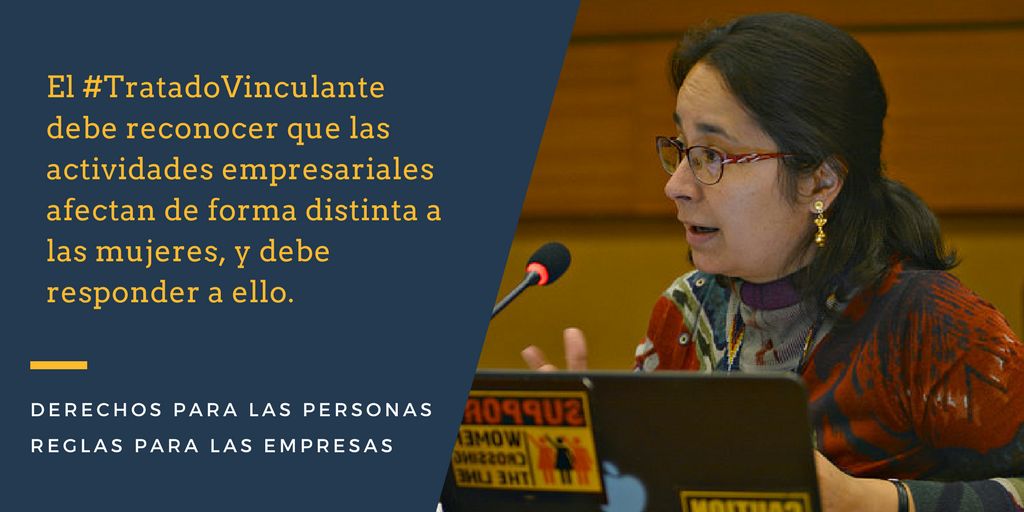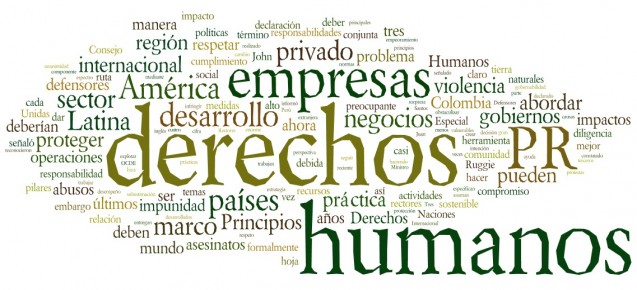“Below, we offer a google translate version of the original article in Spanish. This translation may not be accurate but serves as a general presentation of the article. For more accurate information, please switch to the Spanish version of the website. In addition, feel free to directly contact in English the person mentioned at the bottom of this article with regards to this topic”
Like every year, during the month of November, the United Nations Forum on Human Rights and Business is held in Geneva. Whenever this event takes place, a particular theme is designated that will be the protagonist. This year, this theme has to do with: ‘access to repair mechanisms’.
The umbrella that protects this high-level meeting is subject to the United Nations Guiding Principles on Business and Human Rights. These Principles constitute the current tool to regulate the actions of national and transnational companies regarding human rights. They were born with the academic John Ruggie and were adopted by the United Nations in 2011, by the Human Rights Council, through resolution 17/4. The objectives of the Board at that time were: identify and clarify corporate responsibility standards; and clarify the role of states. To this end, the established guidelines were divided into three fundamental pillars: the duty of the State to protect human rights, the responsibility of companies to respect human rights and access to redress mechanisms.
The mandate of these guiding principles is to “reduce as much as possible the negative impacts of business on human rights in a short period of time“. They also have general characteristics: (a) they cover all States. (b) they cover all companies, of all sizes, in all sectors and in all countries. (c) identify different but complementary responsibilities between States and companies. (d) they do not create new legal obligations, they elaborate based on existing obligations and best practices for States and companies. (e) are based on the idea that it can not be compensated: positive impacts do not compensate for negative impacts on human rights elsewhere. (f) they are a mixture of regulatory and voluntary approaches.
The context that gave birth to these principles is not different from that of today. The actions of the companies (even after the adoption of the principles) and their consequences, continue to show that national and international regulatory frameworks have not met the objective of protecting human rights. During 2016 we have witnessed the largest massacre of human rights defenders. Around the world, vulnerable communities have been violated their rights (housing, health, life, a healthy environment, among others) because of the actions of companies and corporations.
This situation has shown that the guiding principles have not yet managed to become an effective preventive framework regarding human rights violations due to corporate actions. In this sense, it is understandable why in the session of the Forum this year 2017 has focused on access to reparation. This third pillar refers to the existence of effective remedies for victims of human rights violations. At the state level, it is expected that States take appropriate measures to investigate, punish and repair. On the part of the corporations, the principles encourage the existence of early warnings that identify negative impacts and allow resolving complaints before the situation escalates to more damaging scenarios.
Since DD.HH. are currently at the mercy of business activity, the role of the States becomes fundamental. Specifically in regard to the strengthening of regulatory frameworks at the domestic level. For this, an essential part of the obligations of the States has to do with: ensuring access to judicial and non-judicial mechanisms; and reduce the obstacles to access to justice. In this regard, it is necessary to emphasize that non-judicial mechanisms play a very important complementary role. Some of them include: State mechanisms, national human rights institutions, ombudsmen, complaints offices, National Contact Points (OECD), among others.
The application of the guiding principles by the States has been given through the form of National Plans of Action. It is expected that these plans will be constituted as instruments that:
– Promote greater coordination among government agencies with direct involvement in business issues and human rights.
– Promote the protection of human rights through due diligence in companies.
– Identify national priorities regarding this topic and translate them into concrete public policies
– Ensure monitoring and evaluation of the implementation of the plan, in a continuous manner.
– Are based on a platform of continuous dialogue with all the actors involved (government, companies and civil society)
– Possess a flexible format for cooperation, coordination and international exchange of good practices and lessons learned.
– Strengthen regulations at the domestic level.
The result of the development of these plans around the world leaves much to be desired. There are still many States that have not embarked on this process and those that have done so have not succeeded in having their plans promote a framework strong enough to respect, protect and / or remedy.
The situation of widespread vulnerability to this problem has raised doubts about the effectiveness of the guiding principles, and a process to create a legally binding instrument has been developed at the same time. During the Forum, it is expected to debate about the roles that the principles and the binding treaty would occupy. Although opinions are divided (between those who support one initiative or another) it is necessary to clarify that the principles and the treaty are complementary. A binding instrument is a step forward with respect to the guidelines. To achieve this progress it is necessary to protect the autonomy of the process of construction of the treaty since, in short, this initiative would give greater impetus to the guiding principles, and would give greater and better content to the action plans.
More information
– Advancing towards a binding treaty on transnational corporations and human rights
– Discussions in Argentina regarding a business treaty and human rights
– We participate in the second regional consultation of ECLAC on human rights and companies
Author
Agustina Palencia, agustinapalencia@fundeps.org
Contact
Juan Carballo, juanmcarballo@fundeps.org



